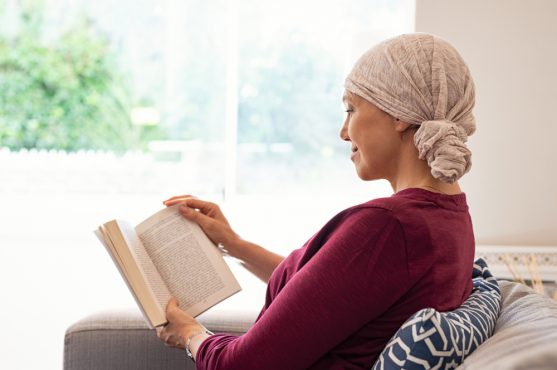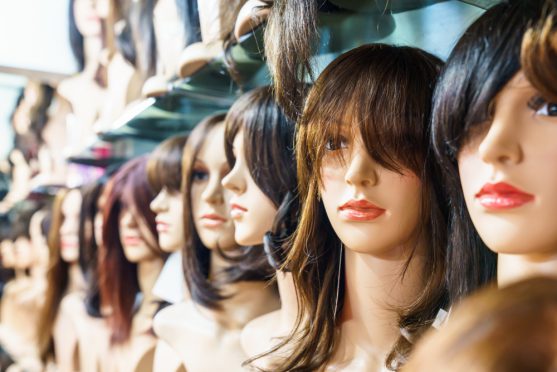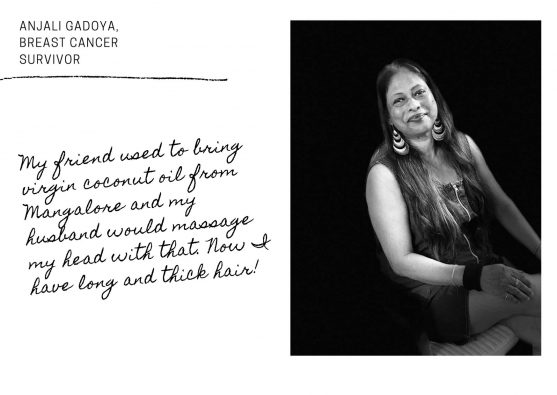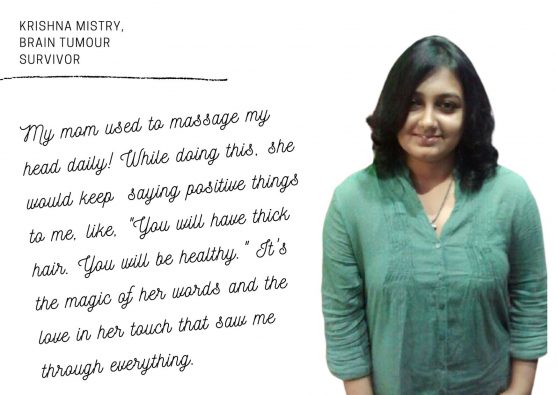One of the things everyone seems to know about cancer treatment is that it causes hair loss. That’s no secret. But you should also know that this is a temporary side-effect and your hair will grow back.
Not all drugs used in cancer treatment cause hair loss. So speak with your oncologist to check if the drugs prescribed for you cause hair loss or not.

Q. When will the hair loss start?
It usually starts 2 to 4 weeks after you start your treatment. Apart from chemotherapy, treatments like targeted therapy and hormone therapy also might cause hair loss.
How much hair you will lose depends on the drugs used and the dosage as well. Some drugs may cause complete baldness, while others might cause only hair thinning.
It’s not just the hair on your head, but anywhere on your body (including eyelashes and eyebrows) that might be affected.
Unlike regular hair fall where you see a few strands of hair on your brush or pillow, chemo-induced hair fall is more rapid. So you might see clumps of hair falling off in one go.
Yes, it can be upsetting. So many choose to have their head shaved even before starting chemotherapy. That way they have some control over how and when their hair goes.
Q. Why does this happen?
Chemotherapy drugs are designed to kill the rapidly growing cancer cells. Unfortunately, sometimes they affect the other rapidly growing, healthy cells as well in the process. The cells in your hair roots fall into this category.
Q. Can I prevent this hair loss?
The short answer is no. Studies have not found any successful way to completely prevent this hair loss. But there are some things you can do to reduce the hair fall, and help in the regrowth of your hair.
-
Treat your hair very gently during this time. Use a soft bristle brush and avoid all styling products, colouring or bleaching.
-
Avoid all heat based procedures like straightening or curling.
-
Use a mild, alcohol-free and fragrance-free shampoo.
-
Keep your hair and scalp covered when you step outdoors.
-
After washing, use a soft towel to dry your hair. Allow it to drip dry afterwards.
Q. How do I prepare for this hair loss?
The first step is to mentally prepare yourself for this hair loss. Many cancer fighters worry about how their social interactions will be affected due to this hair loss. For a lot of us, hair plays an important part of our self-image and personality.
There are two ways of dealing with this and you can choose whichever you prefer, or even alternate between them depending on the situation:
-
Hide your hair loss
If you do not want to be asked any questions about your hair, or prefer to keep your treatment a secret, you might want to hide your hair loss.
It is possible to use well-fitted wigs and caps to do this. Some find them uncomfortable, while others just love how the wigs make them look even better than they looked before cancer.

Some fighters shave their hair and have a wig made with it. This way they are still wearing their own hair and the colour and texture is what they are familiar with.
Some others prefer to go for glamorous wigs that enhance their looks and give them a complete makeover.
-
Flaunt your bald head
Increasing number of fighters are choosing to flaunt their bald head. It is more comfortable, while saving time, money and effort.
Once you’ve made your choice, you can make the necessary arrangements.
Q. When will my hair grow back?
Usually, hair starts to appear within 2 to 4 weeks of completing treatment. Your new hair is likely to be different in texture, sometimes even colour, when compared to your old hair.
At first, the hair grows back fuzzy and soft, like the hair of babies. It usually takes about three months after stopping treatment for the hair to grow thicker.

There is no sure way to make it grow back any faster, but you can do a few things to keep the scalp and new hair healthy.
-
Your scalp tends to feel tender and sensitive during treatment. Remember to moisturise it with a thick, non-alcoholic lotion.
-
Regular oil massage seems to help some cancer fighters with their hair growth.
-
Use silk pillows (as opposed to cotton ones) to prevent your hair from drying out during sleep.
-
Avoid using harsh products on your hair, and also avoid colouring and heat-based treatments.
-
Keep hair brushing to the minimum.
Speak to your doctor about drugs and treatments that can help with hair regrowth, if you are still worried about it. 


